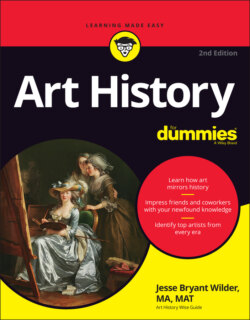Читать книгу Art History For Dummies - Jesse Bryant Wilder - Страница 122
Greek Art, the Olympian Ego, and the Inventors of the Modern World
ОглавлениеIN THIS CHAPTER
Jumping bulls with the Minoans
Understanding Greek sculpture
Interpreting Greek vase painting
Touring Greek ruins
Tracking Hellenism
Everything that grows great also decays. But the memory of our greatness will be bequeathed to posterity forever … the admiration of the present and succeeding ages will be ours, since we have not left our power without witness, but have shown it by mighty proofs … we have forced every sea and land to be the highway of our daring, and everywhere … have left imperishable monuments behind us.
—PERICLES (Athenian Statesman, Fifth Century BC)
Pericles was right. The world he helped create did decay. But its memory and influence have lasted for nearly 2,500 years, reaching across the ages into our day-to-day lives.
Whether you’re watching a play or movie; cheering your country at the Olympics; debating an ethical question; visiting the Lincoln Memorial in Washington, D.C.; wrestling with an abstract math problem; or voting for your local mayor, your actions are rooted in Ancient Greece. The Greeks wrote the blueprint for the modern world. They invented democracy, logic, ethics, drama, the Olympics, the study of history, theoretical math, and rational inquiry (the precursor of modern science). They also laid the foundations of Western art and developed architectural styles that we still mimic today.
We owe our Western heritage to all of Ancient Greece, but especially to Athens (located on the coast of the Aegean Sea), which may be the most creative city in history. (Florence, Italy, runs a close second — see Chapter 12.)
How did a tiny city-state the size of Toledo, Ohio, launch the modern world two and a half millennia ago? Read on.
